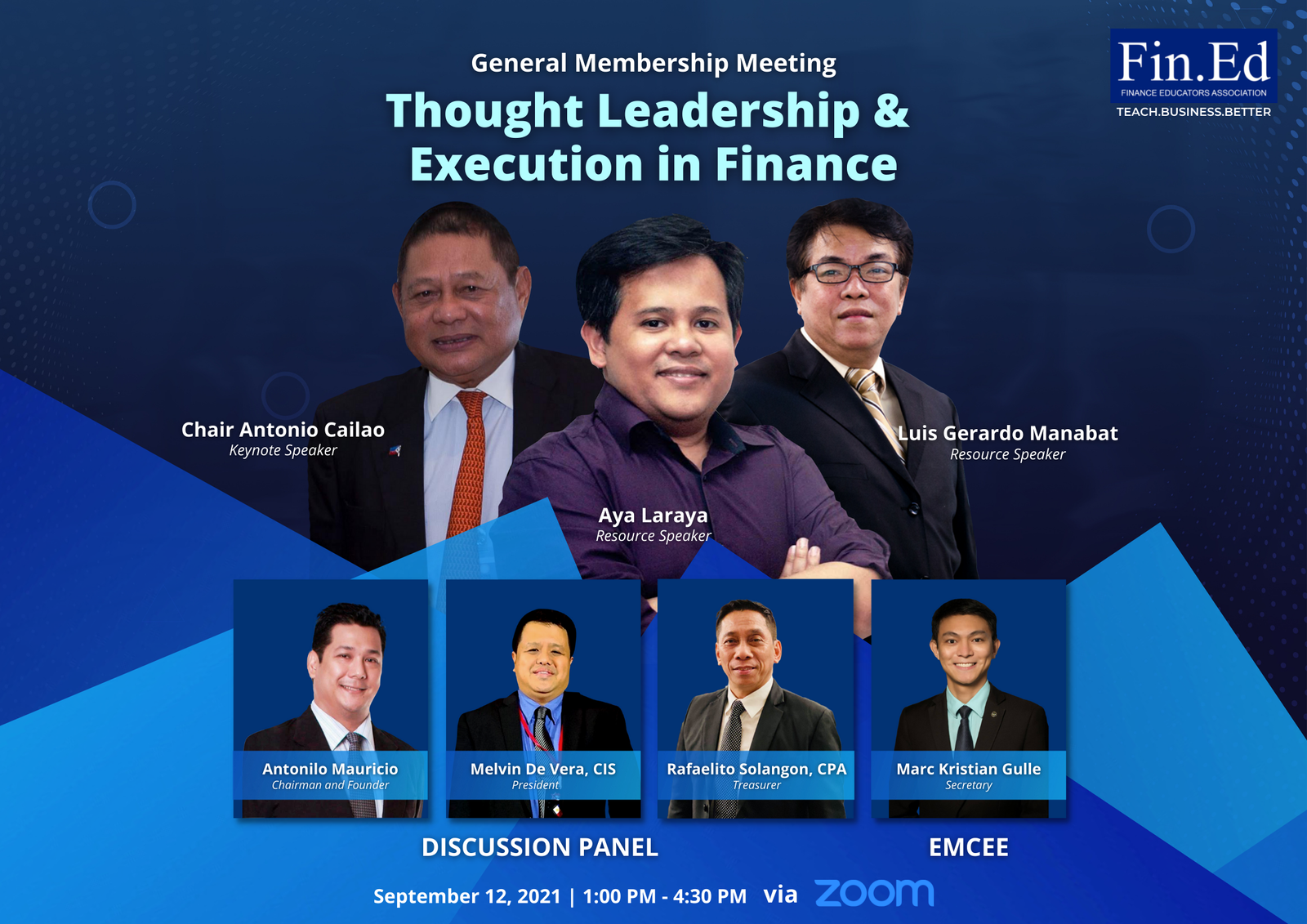With a theme of Thought Leadership and Execution in Finance, Finance Educators Association or Fin.Ed held its General Membership Meeting last September 12, 2021 from 1 p.m to 4:30 p.m via Zoom app.
The meeting was divided into two parts– the general session and the planning session which is exclusive only for members.
Antonilo Mauricio, the Chairman and Founder of Fin.Ed opened the event by sharing his insights on the financial literacy campaign of the organization and the rest of the Financial Literacy Partners or FLP.
According to Mauricio, the mission of Fin.Ed and the FLP is to promote economic progress through widespread financial literacy. They think that there is a gap that needs to be filled regarding the plight of finance teachers and finance education in the country. Their plan is to evangelize financial literacy first to the educators and the financial students who in turn will promote this with their own personal finance modules to the rest of society, specifically to the marginalized sector.
Also he also pointed out that Fin.Ed and FLP is responsible for countering the culture of consumerism, inculcated on individuals’ right from a very young age, by the marketing on television and social media. Their association will encourage others and give them a pathway to save and invest and eventually attain financial freedom or living the life of not being overly concerned with money.
Moreover, he related to the theme by defining thought leadership as original ideas that spark beneficial innovation that must always be hand in hand with execution. “Sometimes you have to stop planning and know when to start doing,” he said pertaining to analysis paralysis.
“We must be the inspiration of our students as finance educators. It is a sad reality that even finance professionals and finance teachers have problems with their own financial condition. It doesn’t mean that when you’re a finance educator that you are prosperous, but what it means is that you have the capability and the means and the knowledge to get out of your predicament, and that’s what distinguishes us from other people,” he concluded in his welcoming speech.
Meanwhile Chair Antonio Cailao, Chairman of the Board of Directors of AIESEC Alumni Philippines, being the keynote speaker, discussed the concept of thoughts and leadership, Environment and Social Governance (ESG), climate change, United Nations’ Sustainable Development Goals (SDG) and the crucial role of finance people.
Cailao defined thoughts as ideas, unique points of view and fresh insights which is transformative in ways that it lends utility to a new fresh status quo. The challenge is to spring up ideas that provide an experience of otherness and spot on with new strategic flavors.
Leadership on the other hand, for him is having the power to influence and maximize the effort of others towards the achievement of a goal or a purpose. It is inspiring others to dream, learn and do more. Leadership is helping those doing poorly to do well and for those doing well, to do better. It is going to a pathless road and leaving a trail for others to follow. Additionally, it engages people to a purposeful action.
Further, he mentioned the sources of thought leaders’ power to influence, the positional and personal. Positional power is awarded to an individual as a leader while personal power is not easy to acquire, it requires hard work and assiduous in depth study until expertise is achieved, and most importantly, it cannot be taken away.
According to Cailao, a thought leader must be a subject matter expert with various topics. In line with that, he educated the audience about the Environment and Social Governance or ESG. He tackled that it is an evaluation of firms’ collective conscientiousness on social and environmental factors and measures elements related to sustainability and societal impact of the business.
With that, firms had changed their objectives overtime since investors pick companies with higher ESG. Cailao shared an adaptation of a statement for incorporation made by the association of 181 USA top notch CEOs last August 19, 2019 declaring the need to serve stakeholders and not only shareholders. The five stakeholders enumerated were the shareholder, customer, employees, suppliers and the community at large. He expounded that while some say shareholders must be prioritized, when you look at the balance sheet, the right side also comprises the liability section, where other stakeholders would come in.
He also presented climate change facts in his discussion. He stated the 2016 Paris Agreement that seeks to fight climate change and global warming. There’s also the Intended Nationally Determined Contribution (INDC) where member countries promised to manage climate change, be carbon neutral, and reduce their carbon emission by the years 2030-2050. However, Climate Tracker, said “These intended contributions are merely policies announced, not enacted and there are no globally accepted protocols to penalize or punish non-compliance.” Cailao shared that the latest thinking in handling climate change now is adaptation and mitigation and said, “
It is not Mother Nature that mankind can control, it is lamentable humans themselves.”
Additionally, he stated that the Sustainable Development Goals have touched the three pillars of ESG, the social, financial, and the environment, and highlighted the importance of clean water as 0.18% only of earth’s water is available for mankind.
In Cailao’s talk, he quoted CEO Backer of the Business Council for Sustainability Development in Rio de Janeiro, saying “Financial people will save the world because they are the ones who prepare this ESG reports.” Organizations such as Sustainable Accounting Standards Board and Global Reporting Initiatives (GRI) are examples of those.


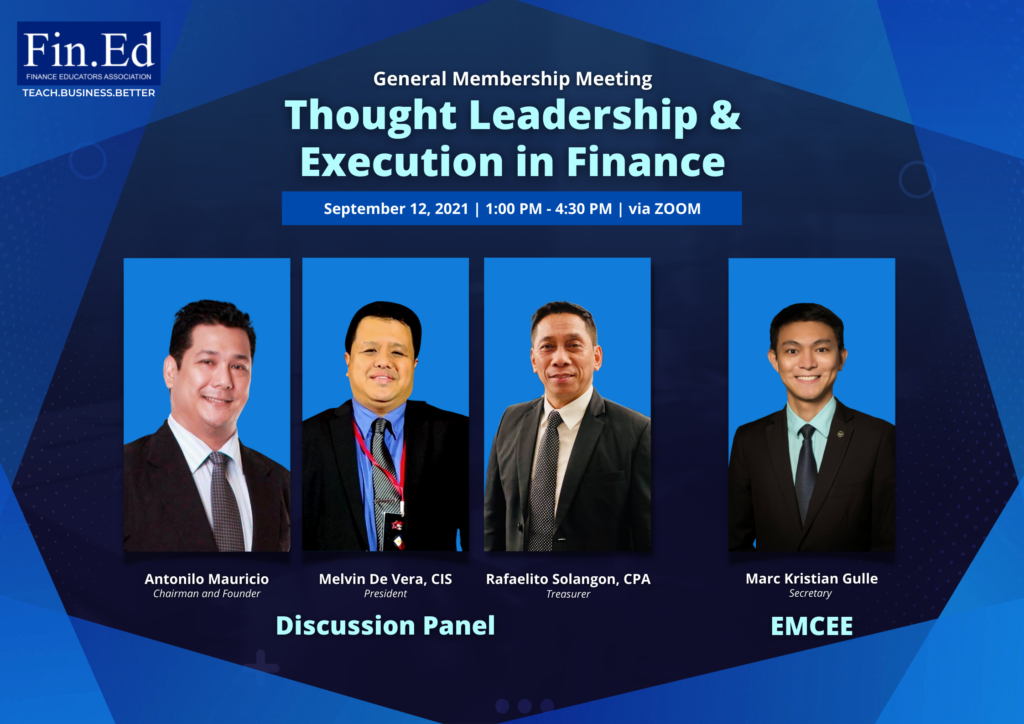
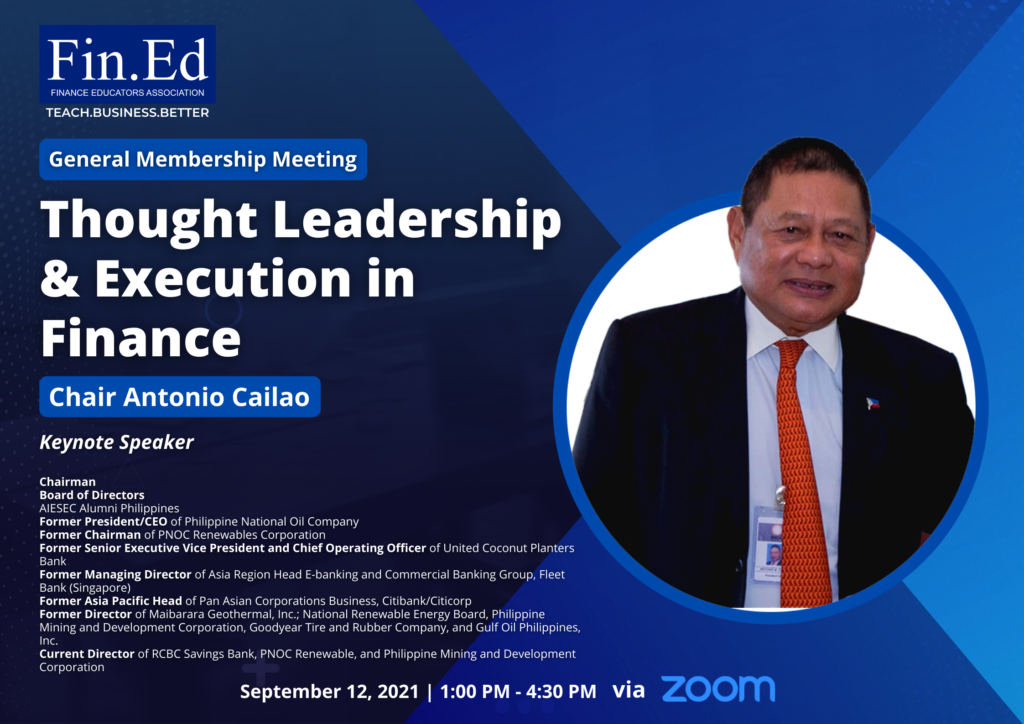







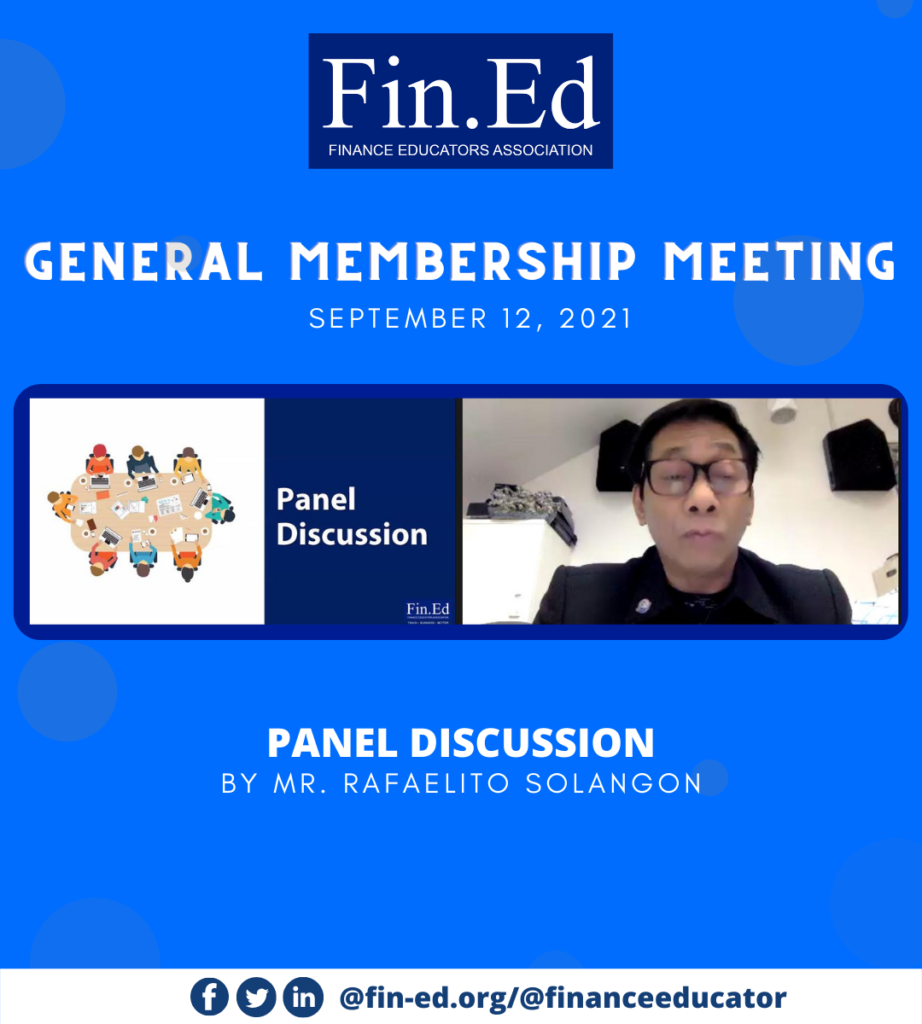


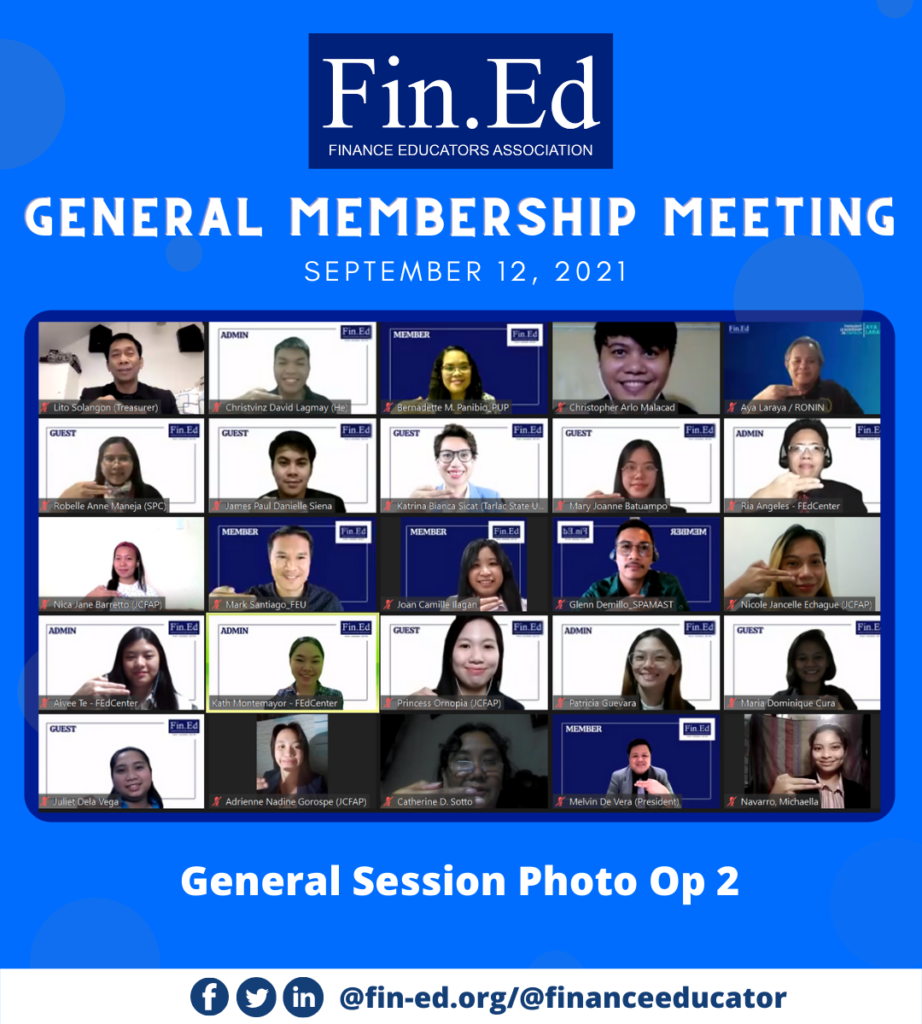



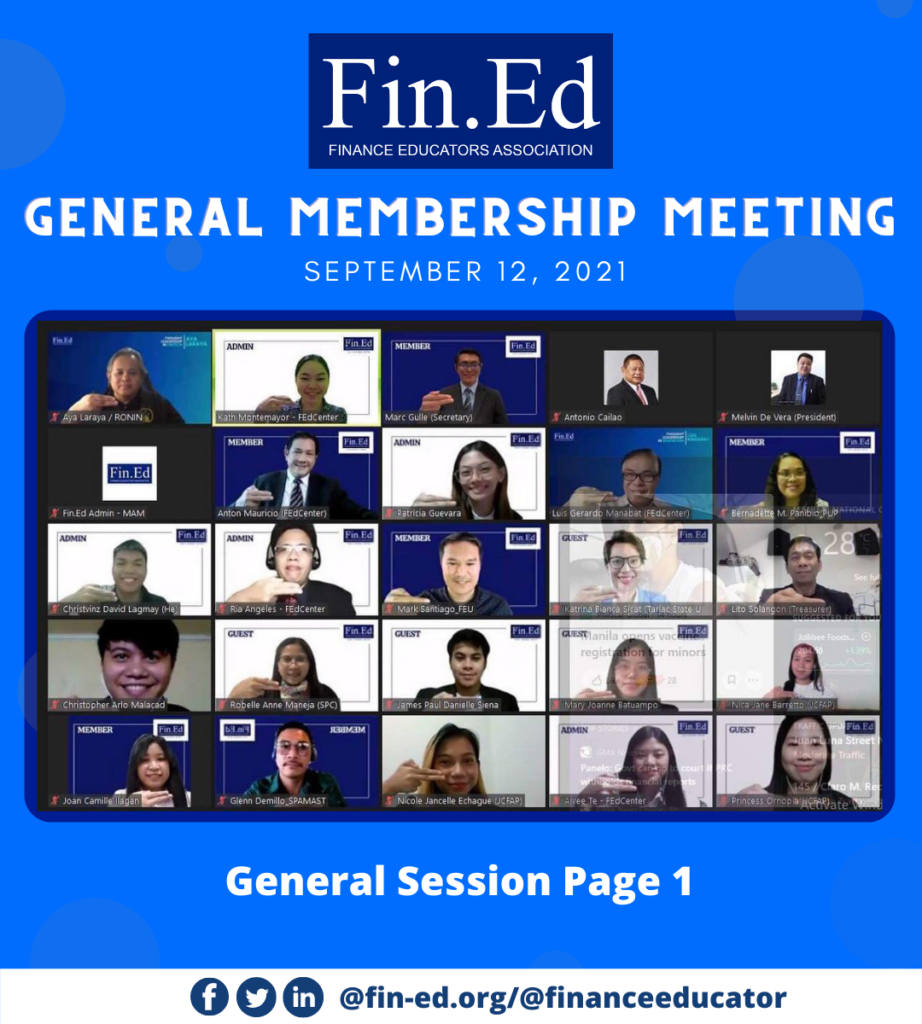


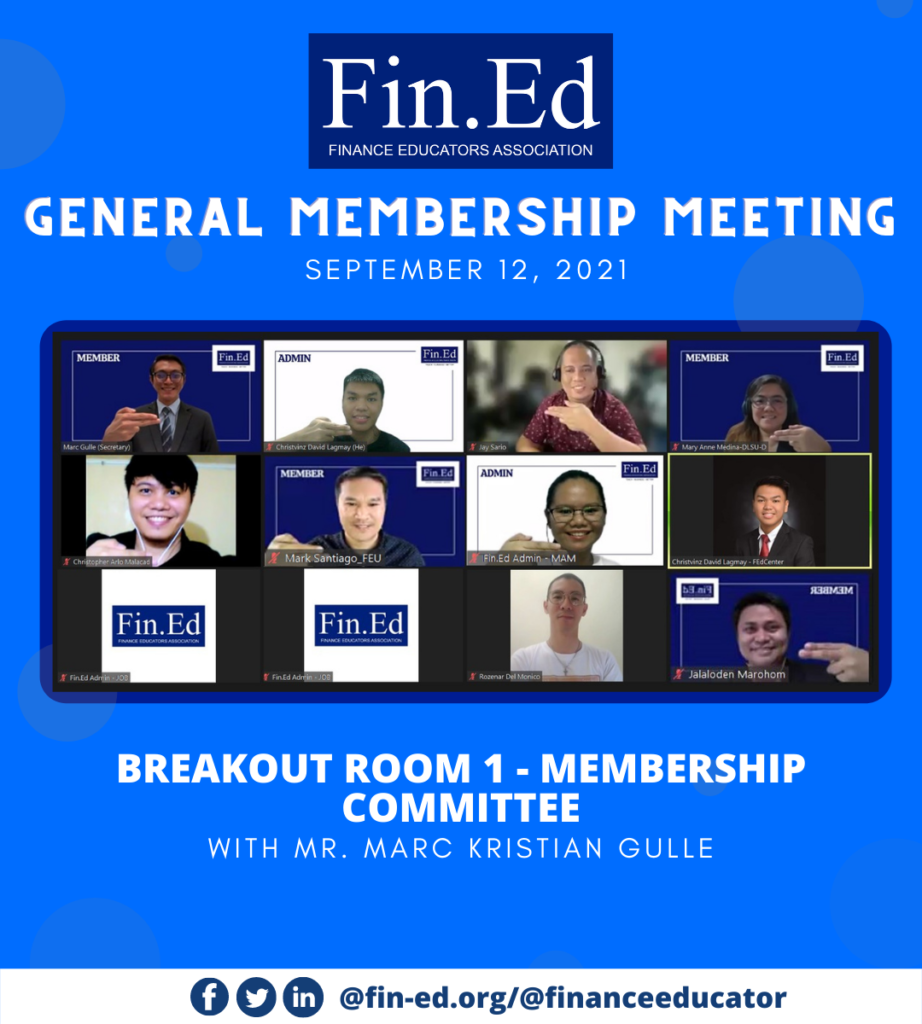



For the first resource speaker, Aya Laraya, the Founder of Ronin Management Consultancy
and Holdings Limited, presented the Thought Leadership in Fin-tech specifically the late evolution of what has been taught in schools regarding finance, the pesos and sense, and Ronin advocacies and products.
Laraya believes that what has been taught on finance has not evolved all this time and seems obsolete, especially with the advent of social media. “Those things that are taught, being learned, those are based on american assumptions, people think stock market is good, yes American stock market is good, but is the Philippines the same?” he said.
Laraya also shared that he is the man behind the tv show Pesos and Sense self funded by him. He said that he wanted objectivity by establishing credibility in the field of financial literacy and challenged the status quo by lacking a financial sponsor when in fact it’s a financial tv show. More importantly, Pesos and Sense opened new opportunities and changed lives, proven by the messages of his students from Dubai.
According to Laraya, what he’s building right now is the Ronin that just started to partner with the FLP. “Financial literacy is a team effort, it cannot be done by one person, one company, and one organization, it has to be a team effort,” he said.
Ronin products include TVM app, Microsite and the Ronin Dojo.
The TVM app is designed for the Filipino environment. It became the number one in the Apple play store among paid financial apps used by professionals because it gives people what they need and provides them what would make their lives easier.
Microsite on the other hand is for financial professionals who don’t have resources to spread their message, brilliant ideas, and good advocacies.
Lastly is the Ronin Dojo, a learning management system. In Laraya’s talk, one of the reasons they have the Ronin is the millions of pesos scammed from OFWs who failed to place their investments in the right baskets. They have been part of financial seminars and workshops but at the end of the day, it’s still not translated into action.
And in relation to the theme Thought Leadership, Ronin will partner with a local government unit to launch a startup competition, so that new ideas and fresh concepts from young people are brought to the floor, especially today that so many things are happening in order to challenge the way things are done. In relation to the startup, he shared that his biggest frustration is when young people ask for million dollar valuations of their companies and their ideas yet, no one in their team was ever trained in finance.
For the panel discussion portion, Rafaelito Solangon CPA, the Fin.Ed’s Treasurer commented on Laraya’s discussion. Since he is in public practice, he noticed that companies are having a hard time because they don’t prioritize the finance department. Companies merely summarize datas and lack analysis, forecasting and budgeting financials. Moreover, finance people are overlooked ever since employment. Requirements are put on audit and due diligence. And in the industry, Chief Financial Officers and financial managers are also overlooked and give importance to them only when the company is at risk of losing money.
When asked by a participant about the best business in this time of pandemic, Laraya said that it would depend on your core competencies, how much money you have, and most importantly how much time do you have for your business. “For a fast answer, it would be anything that will take an existing process online. Convert offline transactions into online,” he stated.
Atty. Luis Gerardo Manabat CPA, the President of Finance Education Center (FEdCenter) tackled the challenge of online education in today’s generation being the second resource speaker. Among them are the topics on Generation Z, hows and benefits of online learning, skills wanted by employers and his experience based takeaways.
Manabat stated that educators have to understand who their students are. “Our position in developing future leaders is very crucial, but during the past several years, we have encountered very challenging times. Things started to move very fast, we were confronted with various challenges. Our students were starting to change. We started to have difficulty trying to reach out to our students,” he said.
He pointed to Generation Z as the students of today, and that they process things faster, much faster than they used to, but tend to be a little shallow. Based on his discussion, Gen. Z doesn’t really dig deep into the problem that if you ask them something that’s in the book they can give it to you by page and by number but if you ask them to analyze they get lost.
Manabat stressed on the role of educators in the new mode of learning wherein students have to learn very fast in a very short time, and where there seems to be loss of control.
He instructed educators to engage their students because if they got bored, they can easily tune the teacher out and the teacher will never know. Further, he shared that they were being asked to exercise empathy– showing concern when talking to them as opposed to the traditional way. “Now it’s no longer simple. We have to put ourselves in the place of our students, how are they feeling, and how are they coping,” he said.
Manabat also questioned educators if do they really train the students to have the skills required by employers such as Ability to deal with ambiguity– ability to adapt to changing circumstances, valuation of seemingly conflicting values; Curiosity or Critical thinking– encouraging students to explore options and analyze things; Openness– being able to share their insights and defending their positions; Entrepreneurship and Empathy- being able to build your business by being a part of a larger organization and not just a job; Resilience– when problems come in students have to toughen up and start working; Rapport and Relationships– the sooner Gen Z get that they are a bigger part of a larger group of people, the better, building their skills on building relationships and coming out of a way to present themselves to people, and finally; Action– “If they don’t make the effort to make it happen, then everything they have learned is useless,” Manabat said.
In wrapping up his presentation, he shared his experience based take-aways such as just being there is not enough– teacher solely attending and lecturing in the class; engage with students– talking to them, giving and asking feedbacks, and lastly; simplify and be practical– relating teacher’s knowledge to practical terms for students to comprehend the concepts and not to gain attention from them.
Afterwards, a panel discussion was followed, started by Melvin De Vera CIS, Fin.Ed’s President.
“We are torn between empathy and assessment. There are a lot of challenges in this new normal,” he commented.
Solangon added that other things to consider about the young generation is their patience to continue working, and low self-esteem. He suggested that boosting their morale, confidence and motivation should be included as training in the universities.
“We have to make them feel that yes, I am a finance graduate,” Manabat eagerly said.
Meanwhile, Mauricio opened up the mental health issue of the young people saying that sometimes the mindset of the older generation is dismissive of the mental health issues of the young. He noticed that mental health cases have gotten worse over the period of time. “I am not those people who will dismiss it and say young people are weaker compared to us. I don’t wanna think that way because I cannot put myself in their shoes,” he said.
Manabat answered to their reactions saying that educators have to go an extra mile trying to understand students’ particular situation without babying them. That’s the balance teachers have to figure out. “We have to relate to students on a personal level, we have to empathize, we cannot stay indifferent from our students’ plights,” he commented.
A question from a participant arose saying that the online graduating class is not yet ready for work. Manabat answered that the best response is– nobody ever is. Mauricio added his insights on that by recommending the book entitled “Ready for Anything.” According to Mauricio, it tells readers that you prepare for success, and it will come, and when it comes you’re not gonna waste the opportunity.
Marc Kristian Gulle, Fin.Ed’s Secretary, guided the event by being the master of ceremonies.

